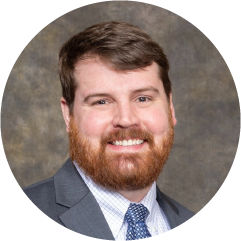This blog is the third and final part of our series of interviews with leaders in orthopaedic surgery management.
At CaseCTRL, we believe in supporting the orthopaedic community as it strives to elevate the experience for surgical patients while also achieving efficiency and better care coordination throughout the surgical scheduling process to improve quality of care and profitability. With this in mind, we recently talked with several surgical practice leaders about common challenges and strategies they are employing at their organizations.
Challenge 3: Many practices are struggling with
the right way to grow their business, especially
with the rapidly shifting competitive landscape.
Over the past several years, many hospitals have been transitioning surgical cases to
the ASC care setting, and the trend is projected to continue. According to research firm Sg2, orthopedic outpatient procedures will grow more than 30% from 2019 to 2029. During that same time, orthopedic inpatient procedures will decline by 20%. Orthopaedic surgeons are having to navigate the right relationships in their market.
To manage this challenge, several steps are key.
- Stay on top of shifting demand to recognize opportunities with your practice and pivot as needed. Consider what metrics you will use to gauge surgical demand in your market. “There are different data sources out there,” says Michael Boblitz, Chief Executive Officer of Tallahassee Orthopedic Clinic. “I like to use a claims data source that includes inpatient and outpatient and allows you to break the data down by procedure. I will ask myself how much demand there is and how much business we have. For new markets, I use claims data to understand the demand that exists and then I use payer data that breaks down populations by insurance coverage and examine which specialties are most backlogged.”
- Part of pivoting is making sure practices stay the provider of choice for value in
their market. As an example, Carneal at Aurora BayCare Medical Center, points
to the pharmacist and surgical practice collaboration referenced earlier in our series. “Pharmacy really comes into play in our value proposition. We have a pharmacist in the inpatient area and in the preoperative area, and having their guidance is a key part of how we’re able to contain cost. Because we can keep drug costs low, we’re able to negotiate from a point of strength with insurance payers or self-pay employers. We’re able to share that not only do we provide excellent care, but we also do so efficiently.
We’re able to prove the value of working with us because we continually keep drug and procedure costs down while hitting shared quality performance metrics.” - Consider what integration would mean to your practice. Osbahr has seen the view from both sides, as he serves as Chief of Orthopaedic Surgery and Managing Partner for Rothman Orthopaedics Florida as well as the Executive Medical Director for the AdventHealth Orthopedic Institute. “I think hospitals have realized that they need to have a partner that’s invested with them, not against them,” he says. “But for both parties, saying you want to collaborate isn’t enough. Time and again, success of the relationship really comes down to ‘How do you build the right systems for care together?’
He notes that growing through merger or acquisition requires a unified focus. “We’re trying to regionalize our care. Building clinics in the right locations and the practice leadership working with the hospital is key, knowing that 30% of that volume at this point is probably going to go to the hospital and probably 70% is going to go to an ASC eventually.” he says. Practices need to think strategically about the best ways to share business and coordinate this care as they continue to grow.
“You want to have an open dialogue with the hospitals on how they can be stewards in the partnership to make sure growth and achieving care quality happens together,” he adds. “How do we make sure that transition is well organized, and we’re not just strategy- and recruitment-focused operationally?
“As we’re moving forward, we’re continuing to make sure missions and goals are aligned, so our physicians are best served,” he says. “If you keep focus on the mission as a healthcare provider to achieve whole person care, then collaboration becomes much easier. When you lead with the quality focus first, then it becomes much easier to have conversations around business goals and managing patient volume.”
The challenges facing orthopaedic practice managers are significant, but many leaders have proven to navigate and deliver high-quality care. While there are no formulas for success in healthcare, there are best practices to ensure that your practice is on the right track.
Still looking for more ways to set your practice up for success? Try CaseCTRL.
We are an intelligent surgery management platform designed to adapt to your unique practice, providing visibility, collaboration, and reducing administrative burden. Learn more by booking a demo with us today.
Special thanks to the leaders who have shared their expertise:
 Michael Boblitz, is Chief Executive Officer of Tallahassee Orthopedic Clinic. As CEO, Boblitz is responsible for providing leadership, strategic vision and for directing the overall management, operations, and future growth of Tallahassee Orthopedic Clinic. Prior to this position, he served as CEO for Reagan Medical Center, Boblitz had dedicated most of his career to leading strategy and business development for several of the top healthcare organizations in the US, including Johns Hopkins Medicine.
Michael Boblitz, is Chief Executive Officer of Tallahassee Orthopedic Clinic. As CEO, Boblitz is responsible for providing leadership, strategic vision and for directing the overall management, operations, and future growth of Tallahassee Orthopedic Clinic. Prior to this position, he served as CEO for Reagan Medical Center, Boblitz had dedicated most of his career to leading strategy and business development for several of the top healthcare organizations in the US, including Johns Hopkins Medicine.
Read Full Bio Here
 Daryl Osbahr, MD, is Chief of Orthopaedic Surgery and Managing Partner for Rothman Orthopaedics Florida as well as the Executive Medical Director for the AdventHealth Orthopedic Institute, and the Orthopedic Residency Director for AdventHealth.
Daryl Osbahr, MD, is Chief of Orthopaedic Surgery and Managing Partner for Rothman Orthopaedics Florida as well as the Executive Medical Director for the AdventHealth Orthopedic Institute, and the Orthopedic Residency Director for AdventHealth.
Read Full Bio Here

Dustin Carneal, is a clinical pharmacist at Aurora BayCare Medical Center and is chair-elect for the ACCP Perioperative Care Practice and Research Network. In 2022, Dustin received the 2022 Upsher-Smith Excellence in Innovation Award from the Ohio Pharmacists Association. This prestigious award recognizes a pharmacist who has demonstrated innovative pharmacy practice resulting in improved patient care.
Learn More About Aurora BayCare Here








